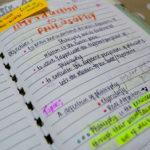If there’s one thing that I’ve learned throughout the course of my university career, it is that there’s a difference between studying hard and studying smart. Too many times have I seen so-called “great students” study for 20 hours straight all through the night and come out with an average or just a decent grade. This may come as a surprise to the hundreds of secondary school students who received exceptional grades after studying for a mere couple of hours. 20 hours should equate to the same, if not a better grade than in post-secondary school, right?
The main difference between secondary school and post-secondary school studies is the sheer amount of content. Each university lecture could equate to a week’s worth of content in high school, if not more.
Read below for a few tricks I’ve learned that will help any student prepare for their exams.
Know what to study
In university, teachers provide deadlines and expect students to follow their own milestones. Usually, it is up to the student to decide which topics are the most important. With this in mind, always have an idea of the weight of each topic before actually studying them. This can be determined during the semester/ school year by looking at the amount of time that the teacher spends discussing them – the more time they spend, the more likely it is that you will see at least one question on the exam. Don’t ever get caught up in a topic you don’t understand if it was only covered for a fraction of the time. If you don’t understand it just keep swimming!
Know how to study
I know a lot of people who study straight from reading their textbooks. For a lot of courses this is necessary, but for the classes where the textbook is simply a supplementary resource (ie. there are no assigned readings and it is only there to provide further clarification) try not to use your textbook as your primary source. I know you probably paid heaps of money for that textbook but what I’ve found is that my own notes, written and annotated by my own hand is better. Psychologically speaking, studying in the same environment you learned the content aids in recall. If you’ve written those notes in class as the teacher is teaching, chances are it’ll strike more cords with you than just reading through the textbook written in someone else’s words. Of course, note taking in itself is a whole other skill: review our blog with tips on building your note-taking skills. All in all, you should be able to break down your notes so that someone with limited knowledge can understand it too.
 After you’ve studied your notes and referred to the textbook, the next step is NOT to read through the notes and hope to memorize each line in a straight word-for-word recall. Practice exams, assignments, tests are the BEST way to prepare for a test. This cannot be stressed enough. Even if you don’t have time to review all the material for a test, going through at least one practice exam should be one of your top priorities. A lot of the time the practice tests are a great reflection of what the actual test would look like.
After you’ve studied your notes and referred to the textbook, the next step is NOT to read through the notes and hope to memorize each line in a straight word-for-word recall. Practice exams, assignments, tests are the BEST way to prepare for a test. This cannot be stressed enough. Even if you don’t have time to review all the material for a test, going through at least one practice exam should be one of your top priorities. A lot of the time the practice tests are a great reflection of what the actual test would look like.
Know when to study
Although everyone is different, I find that I study better when I commit myself to studying at the beginning of the day after I’ve had a meal. Waking up, eating, and then immediately going to study is a great way to stop yourself from making excuses. Try to reward yourself with the freedom to do something after you’ve studied (ex. play a game of sports), rather than condemning yourself to study after putting it off for the whole morning or afternoon.
Another key point is to NOT pull all nighters! Every study has shown that learning solidifies in sleep. Depriving yourself of sleep is not only going to make you tired for the test, but also will make recall the next day much worse! It may seem like a quick fix for a problem but staying up all night should really NOT be an option unless absolutely vital.
Know who to study with
Studying with fellow peers can be very helpful when done properly. Make sure you’re studying with someone who is just as, or more committed to studying as you are. If you’re really behind in a course, it will be helpful to study with someone who is very confident in the course. You can ask all your questions and you can ask for help. If you’re pretty well kept with the course, consider working with someone who is not as prepared as you. Teaching someone, and putting concepts into your own words is a great way to solidify your own learning.
Know where to study
I know it may be troublesome, but consider going to the library. The sheer environmental pressure of silence and everyone working so diligently will inspire you to work hard as well! The commute to the library may seem like a waste of time, but I can almost guarantee you that you could find yourself wasting that time (and more) if you were at home with a TV in one room and a fridge in the other.
So there we have it! Study smart, not hard. Time is precious in your studies making time management and prioritizing key skills to possess.
SchoolTutoring Academy is the premier educational services company for K-12 and college students. We offer tutoring programs for students in K-12, AP classes, and college. To learn more about how we help parents and students in Charlotte, NC visit: Tutoring in Charlotte, NC.




